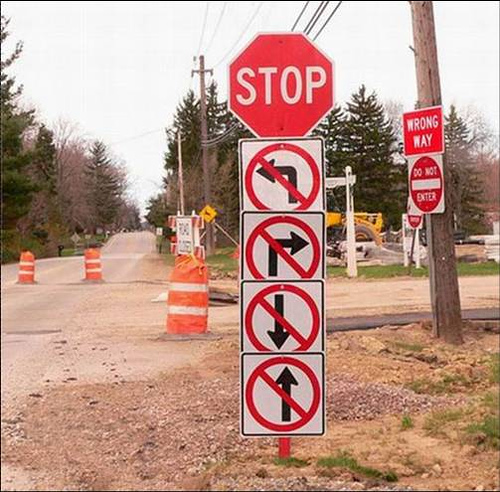 Legalism is an ugly thing to those outside it, but often a beautiful thing to those within it. Legalism is any system whereby the merits of man contribute in any way to his standing with God. For those who have been delivered from the works-righteousness mentality, legalism is bondage, an oppressive system that distorts the grace of God and often turns out neurotic believers who wear themselves out trying to keep up. But to those within legalistic systems, legalism is a refuge from the insecurities of life and the uncertainties of our world. This is one of the reasons why it is so difficult to talk someone out of a legalistic church. There is so much “certainty” and comfort in knowing exactly what one must do to remain in “right with God.” Legalism requires so little faith, because every aspect of life is defined and mandated. In contrast, the concept of grace and Christian liberty is a scary wilderness of uncertainty. Better to stay in the fortress (or prison).
Legalism is an ugly thing to those outside it, but often a beautiful thing to those within it. Legalism is any system whereby the merits of man contribute in any way to his standing with God. For those who have been delivered from the works-righteousness mentality, legalism is bondage, an oppressive system that distorts the grace of God and often turns out neurotic believers who wear themselves out trying to keep up. But to those within legalistic systems, legalism is a refuge from the insecurities of life and the uncertainties of our world. This is one of the reasons why it is so difficult to talk someone out of a legalistic church. There is so much “certainty” and comfort in knowing exactly what one must do to remain in “right with God.” Legalism requires so little faith, because every aspect of life is defined and mandated. In contrast, the concept of grace and Christian liberty is a scary wilderness of uncertainty. Better to stay in the fortress (or prison).
This is not a new phenomenon. At the end of the Middle Ages, the predominant concern of Europeans was the fear of death. After years of bad weather and widespread famine in the 14th century that culminated in the Black Death, life in the 15th century was bleak. As Carter Lindberg notes, “The shortness of life was never far from people’s minds” (The European Reformations, Blackwell, 1996). This situation fueled an obsession with concern for the afterlife. Enter the Catholic Church.
Since hell was not the preferred option, the church and its theologians developed a whole set of practices and exercises to assist people to avoid it. The irony was that in attempting to provide security in an insecure world, the church largely mirrored the new urban and economic developments that exacerbated human insecurity. Suspended between hope and fear, the individual had to achieve his or her goal through a whole system of quid pro quo services that reflected the new ledger mentality of the urban burgher absorbed in the developing profit economy. Taken as a whole, Christendom at the end of the Middle Ages appeared as performance-oriented as the new business enterprises of the day (p. 60).
Pastoral care, while intending to provide security, succeeded only in adding to the insecurity of the individual before God. The reigning paradigm of the Christian life was the phrase facere quod in se est: do what lies within you; do your very best.
In religion as in early capitalism, contracted work merited reward. Individuals were responsible for their own life, society, and world on the basis of and within the limits stipulated by God…This theology, however, enhanced the crisis because it threw people back upon their own resources. That is, no matter how grace-assisted their good works, the burden of proof for those works fell back upon the performers, the more sensitive of whom began asking how they could know if they had done their best (p. 60).
For anyone who has ever lived in a legalistic system, this sounds all too familiar. The fundamentalist variety of today would never deny that salvation is all by grace, but the not so subtle message is that to be “right with God” requires the keeping of the rules. This division between “salvation by grace” and “standing by works” is a theological aberration that has at least two results. The first is that people live in a perpetual state of insecurity regarding their standing with God. This reflects a complete misunderstanding of the nature of justification, whereby we are declared to be in a righteous standing with God, based on the perfect righteousness of Christ. Legalism, in effect, makes the believer’s standing with God dependent on his own works. This creates either self-righteous pride in those who give themselves good marks, or abject despair in those sensitive souls who see their failures more clearly.
The other result of legalism is the emergence of strategies for dealing with the psychoses that arise from this impossible situation. The second half of this essay will recount the emergence of relics and indulgences in the Middle Ages, and the concomitant strategies of legalists today to cope with such a system.


Hi Mark,
Thanks for this. Looking forward to Part 2.
I have thought a lot about this over the past few years. I wonder how much of this legalistic, comfortable, safety-net isn’t fueled in the lives of our people by the way we pastor (preach & counsel).
When many of the sermons preached are focused on and even developed around the imperatives rather than the indicatives – i.e. our sermons are formed around what the person must do, rather that what Christ has done. This is often reflected in the fact that many sermons concluded with – “here are three things you can do this week” or some equivalent.
In do this are we not feeding the people the idea that their standing before God is wrapped up in what they do? Rather than reminding them that their standing before God has nothing to do with what they have done or will do, but is solely based on the person and work of Christ, then calling them to repentance and obedience based on what Christ has done for them, as an act of thanksgiving.
The same is true in how we counsel. When I counsel someone almost exclusively focusing on “what they must do” I can easily lead them to think that their relationship to God is based upon them “finally getting their behavior figured out.” Rather than reminding them of what Christ has done, that they could never do and calling them to live their lives in light of that reality.
The imperatives are critical, they are important, but they occur within a context of the indicatives. When we offer only the one we skew a person’s understanding of what forms the basis of their relationship to God.
I think…
Blessings in Christ,
Joe
Joe, This post was prompted by my reading in the spiritual state of the Roman Catholic Church on the eve of the Reformation. As I read the description, I was struck by the similarities between the Medieval angst about the spiritual bondage in the RCC and the angst I see in so many in people in legalistic churches today. But it is a prison!